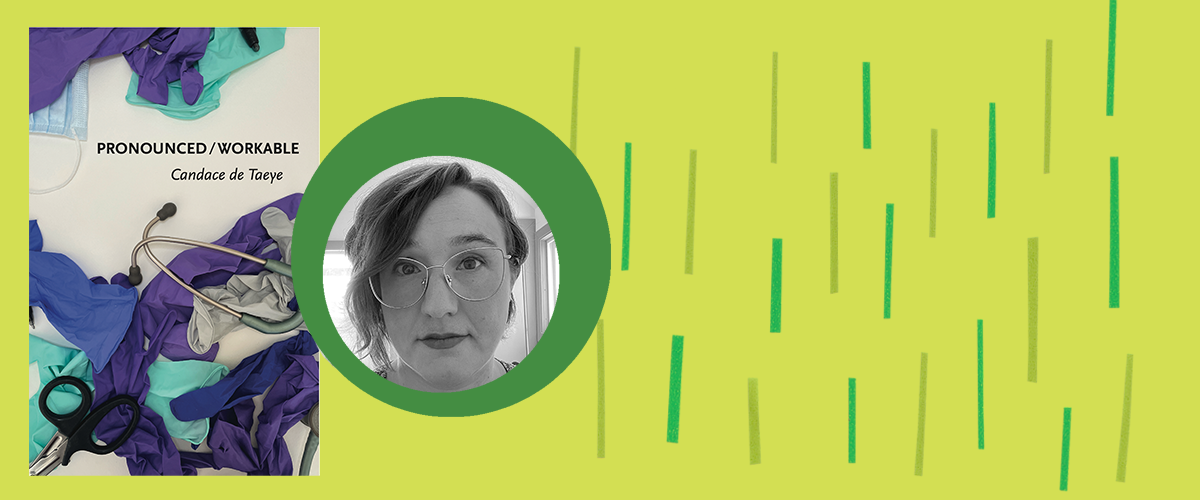
Candace de Taeye
All paramedics accumulate a repertoire of stories throughout their career, but the usual listeners are other medics.
You’re a poet and a paramedic! Can you describe the process of finding poetic inspiration from your work?
I believe most poets find inspiration from the emotive elements they encounter in daily life. Whether that be activism, teaching, travel, caregiving, or voracious reading. The role of paramedic can be a profound act of witness and intervention. You are present in an embodied way on what is often the worst day of someone else’s life. You observe social determinants of health and inequities in a very concrete way. You are suddenly in bedrooms, factories, and other hidden parts of the city.
Doctor-Poets have long been recognized in contemporary poetry- Keats, William Carlos Williams, our own local, John McCrae. They are often lauded for their authority on the human condition. No one is surprised when a doctor excels in another field. Whereas, many people still refer to paramedics as ‘ambulance drivers’, being unaware of our scope of practice. While we may exist in many of the same arenas of care as doctors, paramedics are seen as blue collar workers, and do not hold the same position of authority as MD’s. We are labouring, lifting, living in similar homes to our patients. There is a level of perspective and a commonality in that.
How long did it take to bring this collection to life? Was it difficult ‘bringing your work home’, so to speak?
Some of these poems are older. Written 9-10 years ago. Some are very recent, snuck into the manuscript just a couple months before publishing. The last section is predominantly ‘covid content’. Not just early days, but focusing on the later cumulative waves of the pandemic. I did not have any stay-at-home lockdown time, other than isolation periods after ‘high-risk’ exposures.
I was also a full-time student in the University of Guelph’s Creative Writing MFA from September 2020 to August 2022. A lot of the collection was written, workshopped and polished during my time in that program.
All paramedics accumulate a repertoire of stories throughout their career, but the usual listeners are other medics. We have a very specific storytelling mode in stations. The way these stories are framed needs to be reformatted for a general public audience. Being aware of the Personal Health Information Privacy Act (PHIPA) is always a concern. Translating the content into poems was also a way to obscure identifying details.
Tell us about your writing process? (i.e. how many hours a day, what time of day, where do you write?)
The only part of my writing that is a sustained practice is collecting notes. Interesting words, sentences, bits of dialogue I’ll jot down in my phone and then later transcribe into notebooks. I will collect a lot of this material- graffiti phrases, facts from academic journal articles, dreams, signage- sometimes for months without composing any of it into poems.
Eventually, I’ll have an idea for a poem, or more often, a sequence of related poems. I think a lot of that collected language is simmering together in the background of my consciousness. I will spend a lot of time writing for a few days or weeks. Extracting lines from the content of these notebooks. Then I’ll put the new poems away for a while, weeks hopefully, so I can get a bit of distance before editing them further.
I work shift work and have small children, so I write whenever, and often wherever I get the chance.
You work with many different types of poems; including sonnets, experimental, found text, listicles, etc. Is there a particular poem in this collection that you’re most proud of?
A variety of forms generally keeps me interested when I’m reading a collection of poems, so I try to extend that same courtesy. I believe in the power of working against a particular constraint in a poem, but I’m not sure I’m interested in basing a whole collection off of a single constraint. I consider different poetic forms as various containers, and try to find the right shape of container to best showcase the language of a particular poem.
The poem Google Translate App History is a listicle. It runs in two columns, the left hand side featuring personal medical history questions in various languages, and on the opposite side the English version. (I imagine it was an absolute nightmare for Denis to format for publishing.) It draws attention to language barriers. How does one consciously simplify the phrasing so that the risk of gross translation errors can be avoided? Being aware that there are almost certainly some errors present, but acknowledging my ignorance on what they may be- on scene and in the poem.
What do you hope people take away from Pronounced / Workable?
I hope that readers take away a sense of bearing witness and compassion. Not of someone trying to co-opt the experience of others tragedies. I am present and laying hands on, merely a cameo appearance in many of these transports and larger narratives. These brief exchanges do accumulate into a large part of my lived experience, how could that not affect a person.
